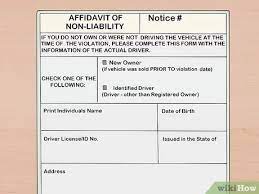If you receive a red light camera citation but you were not the driver at the time of the incident, you typically have the option to contest the ticket and provide evidence to prove that you were not the driver. The process for contesting a red light camera ticket can vary depending on the jurisdiction, so it's important to familiarize yourself with the specific rules and procedures in your area.
If you receive a red light violation and you were not the driver, you can fill out the back of the citation with the correct driver name and mail or fax it to the address or number given. You must include a copy of your driver's license.
Here are some general steps you can take if you were not the driver in a red light camera citation:
- Review the citation: Carefully read the citation and any accompanying information to understand the procedures for contesting the ticket. It should provide instructions on how to dispute the citation and what evidence you may need to provide.
- Gather evidence: Collect any evidence that supports your claim that you were not the driver at the time of the incident. This can include photos, witness statements, or any other documentation that can prove your case. It may be helpful to gather evidence such as time-stamped receipts, GPS data, or other records that can establish your whereabouts at the time of the violation.
- Contact the issuing authority: Reach out to the authority responsible for issuing the ticket, such as the local traffic or police department. Inquire about the process for contesting the citation and ask for guidance on how to submit your evidence.
- Follow the instructions: Follow the instructions provided by the issuing authority to contest the ticket. This may involve completing a form, writing a letter of explanation, or submitting evidence through a specific method or platform. Make sure to adhere to any deadlines and provide all required information.
- Attend any required hearings: Depending on the jurisdiction, you may be required to attend a hearing to present your case. Be prepared to present your evidence and explain why you believe you were not the driver. If you have legal representation, consult with them to determine the best course of action.
The process for contesting a red light camera ticket can vary significantly depending on your location. The specific laws and procedures governing traffic violations and citations are established at the local level. Therefore, it's advisable to consult with local authorities or seek legal advice to ensure you follow the correct process and understand your rights in contesting the citation.
"Snitch tickets" are unofficial notices or fake citations that are sometimes sent to vehicle owners after an alleged red light or speed camera violation. These tickets are not official citations issued by law enforcement agencies but rather deceptive attempts to trick vehicle owners into providing information about the actual driver of the vehicle at the time of the alleged violation.
The purpose of snitch tickets is to prompt the vehicle owner to identify someone else as the driver, often a friend or family member, in order to shift the responsibility and potential consequences of the violation onto someone else. The tickets may be designed to look similar to legitimate citations, including official-looking logos, graphics, and even barcodes, in order to appear authentic.
Snitch tickets typically include instructions for the vehicle owner to submit a form or provide information online to identify the driver responsible for the violation. However, it's important to note that responding to these fake tickets is not legally required, and they hold no legal weight or consequences.
It's crucial to distinguish between legitimate citations issued by law enforcement and snitch tickets. Legitimate citations are issued by authorized agencies and carry legal weight, and they typically provide clear instructions on how to pay the fine or contest the citation. If you receive a citation, it is important to verify its authenticity by contacting the appropriate law enforcement agency or municipal court.
If you suspect that you have received a snitch ticket, it is advisable to consult with local authorities, such as the police department or the municipal court, to confirm its legitimacy. They can provide guidance on how to proceed and protect yourself from potential scams or fraudulent activities.











